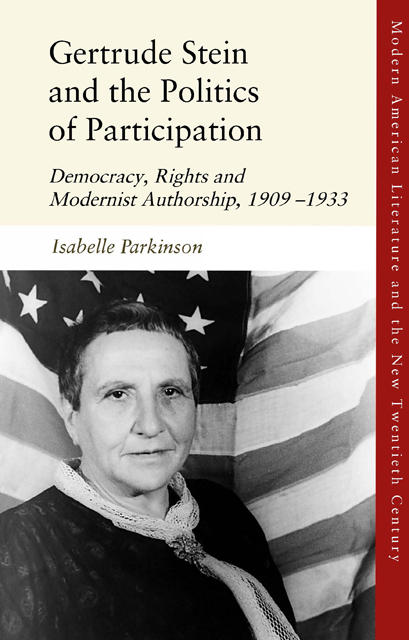 Gertrude Stein and the Politics of Participation
Gertrude Stein and the Politics of Participation Book contents
- Frontmatter
- Contents
- Acknowledgements
- Introduction: Gertrude Stein, Modernism, and Democracy
- Chapter 1 The Politics of Authorship in Three Lives
- Chapter 2 Authorship and Community in Stein’s Pre-war Portraits and Tender Buttons
- Chapter 3 Modernism’s Abject: Geography and Plays and Stein’s Contested Authorship
- Chapter 4 Useful Knowledge and the Mind of Mass Democracy
- Coda: Stein’s Democratic Authorship in The Autobiography of Alice B. Toklas
- Bibliography
- Index
Chapter 4 - Useful Knowledge and the Mind of Mass Democracy
Published online by Cambridge University Press: 25 April 2023
- Frontmatter
- Contents
- Acknowledgements
- Introduction: Gertrude Stein, Modernism, and Democracy
- Chapter 1 The Politics of Authorship in Three Lives
- Chapter 2 Authorship and Community in Stein’s Pre-war Portraits and Tender Buttons
- Chapter 3 Modernism’s Abject: Geography and Plays and Stein’s Contested Authorship
- Chapter 4 Useful Knowledge and the Mind of Mass Democracy
- Coda: Stein’s Democratic Authorship in The Autobiography of Alice B. Toklas
- Bibliography
- Index
Summary
Democracy and Intelligence
As we have seen, after the first flush of positive reviews of Geography and Plays and the serialisation of The Making of Americans in The Transatlantic Review, a series of publications, largely in the con-text of modernist literary culture in Britain, contested the value of Stein's authorship in a public wrangle that explicitly debated the legitimacy of her participation. In this chapter, I will explore in more detail the recurrent trope of intellectual disability used to present her work as engendering a future of Western cultural degeneration, and the contrasting claims that her writing reflects a new democratic sensibility, situating these ideas in their context of the broader public discourse on the future of intelligence in democracy represented by the pamphlet series To-day and To-morrow. I will also argue that Useful Knowledge, the 1928 publication that repackaged a collection of pieces written between 1919 and 1925, is Stein's attempt to frame both her work and her authorship as exemplary of the successfully democratised, future-oriented mind of America in a direct response to the arguments that contest the validity of her literary practice.
In the texts debating Stein's legitimacy, her work is portrayed as either expressive of identifiable mental ‘defects’, as a degenerate strain of human thought that cannot or should not be reproduced, or as a manifestation of the new type of intelligence emerging with modern democracy. The discussions of Stein use her work to make predictions about the future of the collective intellect in mass democracy. These representations of her authorship are cast in the same terms as the broader discussion of the ethics of democratic participation across Anglo-American inter-war literary culture, reflecting a growing concern with the regulation of the minds that have the right to participate in new contexts of full suffrage. The debate over the merit of Stein's work in the mid-to-late 1920s takes place in the context of broader discussions of the ethical ramifications of full democratic participation. As we have seen in Chapter 3, it is a pacy, responsive conversation in which the writers involved wrangle over the value of Stein's work and the legitimacy of her author status in a shifting network of fragile positions and allegiances that reveal fundamental and interconnected anxieties about authorship and democracy.
- Type
- Chapter
- Information
- Gertrude Stein and the Politics of ParticipationDemocracy, Rights and Modernist Authorship, 1909-1933, pp. 189 - 226Publisher: Edinburgh University PressPrint publication year: 2023


